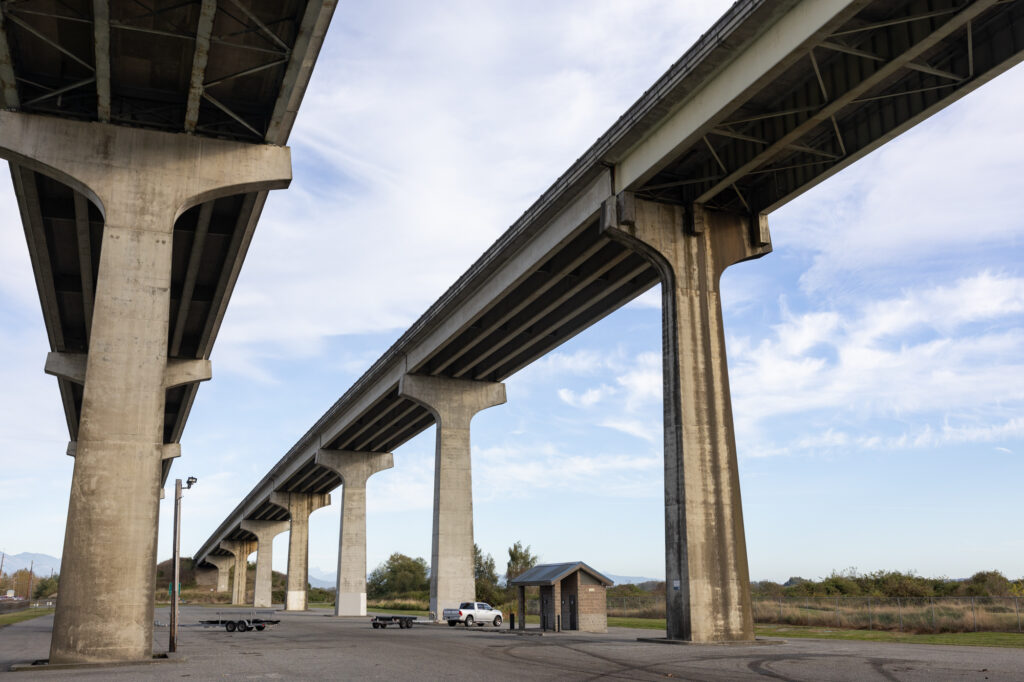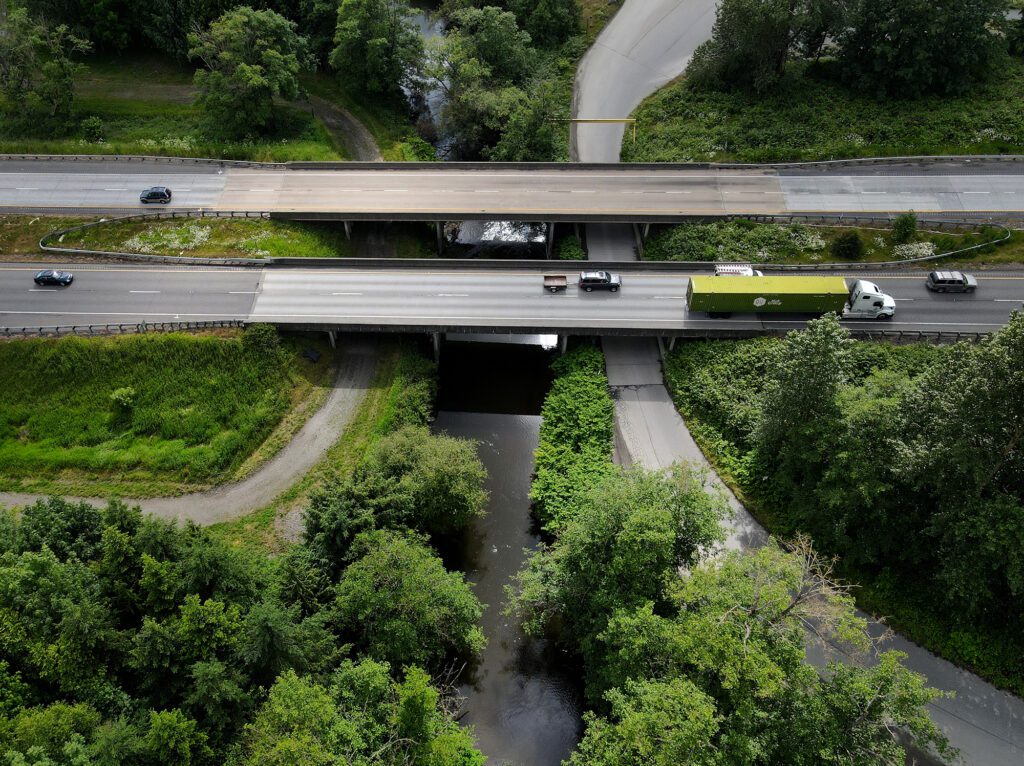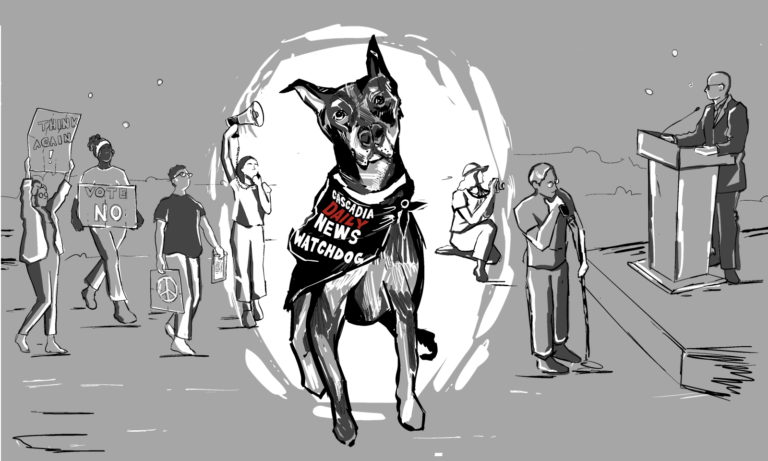This election reporting is provided free to all readers as a public service by your locally owned Cascadia Daily News. Thanks for supporting truly local news by donating to CDN or subscribing here.
From electric ferries to interstates, fiber optic networks to fish-friendly culverts, and snow plows to sewage treatment plants, infrastructure is simultaneously a sweeping concept and the core service offered at every level of government.
Faced with pinched budgets and the possibility of major revenue streams being shut off if statewide ballot initiatives succeed, candidates are searching for ways to balance the constant need for maintenance, upkeep and expansion of aging facilities with the new demand for modernized, equitable infrastructure in forms that weren’t even imagined a century ago.
A significant amount of infrastructure funding flows downhill from the federal government in the form of direct spending or grants — for instance, the 2021 Bipartisan Infrastructure Law resulted in $11 million going to broadband internet for Point Roberts and adjacent underserved areas.
U.S. Rep. Rick Larsen, running for reelection in the 2nd District, is the top Democrat on the House Committee on Transportation and Infrastructure and prides himself on bringing home federal money for transportation projects like safe routes to schools in Lynden and Blaine’s Bell Road railroad crossing upgrade.
At the state level, elected officials have their own role in moving money around.
Washington state treasurer and candidate Mike Pellicciotti touts LOCAL (Local Option Capital Asset Landing Program) in which cities, counties and other taxing districts can take advantage of the state’s strong credit rating to get excellent financing terms for capital expenditures. In 2022, Skagit Fire District 14 borrowed $1.1 million through LOCAL for a dormitory addition to its fire station. Pellicciotti’s opponent, Sharon Hannek, has said she is more focused on cybersecurity, lower taxes and public spending disclosure.

Green energy and transportation are a spending priority due to state mandates like the Clean Energy Transformation Act, which requires the state’s electricity supply to be free from greenhouse gas emissions by 2045.
The Climate Commitment Act is a cap-and-invest program that has already brought in $2.2 billion through the sale of pollution permits at state auctions. CCA funding cannot go toward road construction, maintenance or bridges — the revenue instead goes to climate-related community projects, public transit and energy infrastructure.
Opponents who are seeking to repeal the CCA through Initiative 2117 say the program has caused rising gas prices. Several candidates, such as Sen. Keith Wagoner and John Snow in District 39 and Kamal Bhachu in District 42, either explicitly support Initiative 2117 or call more generally to lower the cost of living.
“What we’re doing right now on this gas tax is, it is a burden on each and every one of us living in Washington state,” gubernatorial candidate Dave Reichert said during a debate on Sept. 18. “We need to pause that gas tax. We need to step back and take a look at where we’re heading.”
State Rep. Liz Lovelett, running for reelection in District 40, is a self-professed infrastructure lover and a proponent of the CCA.
“Creating a program that uses an economy-wide solution to meet our emission goals, reduce pollution, invest in transit, build ferries, leverage federal funds to do big projects like a hydrogen generation hub — this is how we are going to build the economy of the future,” Lovelett told Cascadia Daily News.

Lovelett has taken on ferries as her top priority. She’s the co-founder of the Ferry Legislator Caucus and has helped direct $682 million in ferry investments. It never seems to be enough, however — in September the governor approved emergency funding for San Juan Islands ferries to improve reliability, and Whatcom County’s plans to replace the aging Lummi Island ferry are threatened as the project costs skyrocket.
Infrastructure hand in hand with public works
At the local level, infrastructure often goes hand in hand with public works. Jim Rioux is a project manager for the City of Olympia Public Works Department but moonlights on the board of directors for the Washington chapter of the American Public Works Association.
Rioux said the legal complexities of approvals, fuel and material costs, supply chain issues, and people leaving the workforce are all factors that add to the time and expense of public infrastructure projects.
“The issue is the funds go less far every year. The cost and complexity of projects increase over time without the resources — or even if you have the resources, you don’t have the manpower,” Rioux said.
Outgoing Gov. Jay Inslee said in March that his successor and lawmakers will see strained transportation revenues and increasing project costs.
Raymond Pelletti, running against Alicia Rule for the District 42 Position 1 House seat, sees it differently. He thinks the money is there but has been misallocated or diverted.
“They say we’re gonna spend $500 million for whatever system or road or whatever. And as it gets down into the funding process, it ends up being diverted because people have a hand in the pie and say, we need more money going here than there. Well, didn’t you approve it for here? Yes, but we need more money going here and there,” Pelletti said during a CDN interview.
Rule believes helping communities improve their infrastructure is one of her most important roles as a legislator — she wants community members to reach out to her office with specific needs.

42nd District Position 2 Rep. Joe Timmons said in his time as vice-chair of the House Transportation Committee, he has emphasized the need for maintenance and preservation.
“We need to take care of what we’ve got, we need to fix potholes. We need to make sure that our highways are up to snuff and that people who are trying to get to work don’t blow out a tire, and then have a burden that maybe they can’t afford as a result,” Timmons said.
His Republican opponent, Bhachu, echoed that message, saying he feels bridges in particular warrant more attention and care. Washington’s current maintenance and preservation backlog of bridge projects is about $1.01 billion per year and is only expected to grow as funding fails to keep pace with need. Nearly 30 bridges in Whatcom and Skagit counties are considered to be in “poor” condition.

County commissioners such as Skagit’s Peter Browning and Ron Wesen, both of whom are running to keep their seats, help draft budgets, direct staff priorities, and make land use decisions that influence where public and private projects are installed. Proposed battery energy storage systems, facilities intended to answer the anticipated demand for power from renewable sources, are currently generating a lot of attention in Skagit County. In August, Browning and Wesen signed a letter opposing a battery farm sited on agricultural land outside Sedro-Woolley.
Rylee Fleury, the newcomer running against Wesen for county commissioner, has taken it a step further and says he will file a federal class action lawsuit against one of the companies seeking to build battery storage.
For some candidates — like Eddy Ury, Jeremiah Goggins, Dan Johnson and Atul Deshmane, all seeking a seat on the Whatcom County Public Utility District board — infrastructure is the entire job. By making utility investments and directing project priorities, those officials can help shape the future of energy, water and broadband in Whatcom County.
Julia Tellman writes about civic issues and anything else that happens to cross her desk; contact her at juliatellman@cascadiadaily.com.




